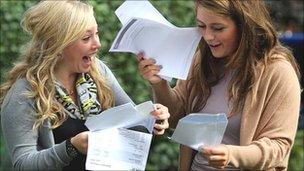A-level results 2010: A* grade boosts new exams record
- Published

One in 12 A-level exams (8%) has been awarded the new A* grade as pupils scored another record-breaking year of results.
Some 27% of entries gained an A or A* and the overall pass rate rose for the 28th year, amid a record battle for university places.
This is the most competitive year for university admissions for a decade, Ucas says.
Some 660,000 students have applied to university.
In 2009 just 482,000 students got places.
More places are on offer this year, but the numbers are capped and universities face fines for over-recruiting.
The pass rate for A-levels rose for the 28th year in a row, with 97.6% of entries gaining an E or above, up from 97.5% in 2009.
Hundreds of thousands of students in England, Wales and Northern Ireland are getting the results of their A-levels and AS-levels.
The A* was introduced this year to stretch the brightest students and help universities differentiate between the best candidates.
To get one, a student has to score an A overall, plus at least 90% in each paper in the second year of the course.
Research from exams regulator Ofqual had predicted that 7% of students would get an A*.
This year is also the first year when students took four modules in an A-level instead of six, answering "stretch and challenge" questions designed to allow them to demonstrate their knowledge fully.
The results showed girls were more likely than boys to get an A* overall, although this is reversed in science and maths. According to the exam boards, which released the results, boys are generally closing the gap at the A grades.
A total of 8.3% of A-levels taken by girls were awarded the new A* grade, compared with 7.9% of those from boys.
Students from independent schools were proportionately more likely to get an A*.
They took some 30% of A*s awarded, although they make up only 14% of entries.
Candidates from comprehensive schools, which account for 43% of A-level entries, gained 30% of the A* grades awarded.
Further education and sixth-form colleges, which enter 30% of candidates, saw students receive a fifth (20%) of A*s awarded.
Science and maths resurgence
The highest percentage of A*s was awarded in further maths at 29.9%. The lowest was in media, film and TV studies at 1.8%.
Across the subjects, science has seen a resurgence this year with biology entries up 4.3%, chemistry up 3.7% and physics up by 5.2%.
The numbers taking maths continued to rise with an extra 4,526 entries, and an extra 1,209 for further maths.
But modern foreign language entries continue to fall, with the numbers entering for French down 3.4% and German down 3.8%.
Going against the trend is Spanish, which has seen a 4% increase.
The results show that traditional subjects remain firm favourites with students, with English, maths, biology and history - as well as psychology - the most popular choices this year.
But despite record successes, many candidates face disappointment over university places.
Applications this year are already up by 12% on last year's record level, with the numbers bolstered by those re-applying after not securing a place last year.
Student Ben Cohen: ''I've been going for interviews...for apprenticeships''
Many universities have warned that they will have far fewer, if any, places available through "clearing" than usual.
Universities minister David Willetts said there were 18,000 courses with places available in clearing this year.
Last year almost 48,000 students found places through this system, which matches available university places to students who did not get the grades they needed for their first choices.
University admissions service Ucas says competition for places is intense.
Chief executive Mary Curnock Cook said: "Thousands of applicants whose places have been confimed today deserve congratulations for this achievement in perhaps the most competitive year for HE admissions in the last 10 years."
She said the body had now processed all A-level results and that more than 8,000 more students had been placed on courses in the UK than at the same time last year.
A record 379,411 applicants had already been accepted into university or college.
But another 180,00 students (26.8% of total applicants) are eligible for clearing, Ucas says. This is because they either have not got the grades they needed for their chosen courses, had no offers to start with or applied late.
At this point last year, about 135,000 were in this position - 22.2% of the total applicants.
'Uncertain future'
National Union of Students president Aaron Porter said: "With youth unemployment pushing one million, savage education funding cuts and arbitrary limits on places, the government is at risk of imposing poverty of opportunity on a generation of young people facing a very uncertain future."
Universities Minister David Willetts congratulated students on their results and said that those who did not get the offer of a university place had other good options.
"It is a very exciting time for all those who receive their results today and I congratulate everyone on their hard work and hope they got the results they need to fulfil their aspirations.
"There are more university places than ever before and already 380,000 applicants have got confirmed places at university. For those who have sadly not done as well they hoped, there are places available in clearing.
"Of course, university is not the only route into well-paid and fulfilling work. That is why we are also investing so much in Further Education and 50,000 extra high-quality apprenticeships."
Scottish students received the results of their Highers and Standard Grade exams earlier this month. The overall pass rate for Highers was up slightly - to 74.6% - creating a new record. A small number of students in Scotland opt to study A-levels.
Half of Scotland's universities have already said their courses are full.